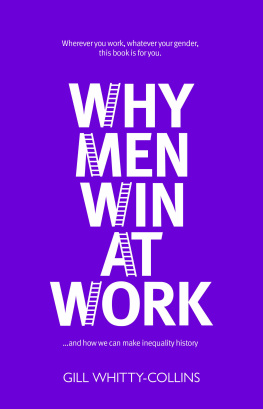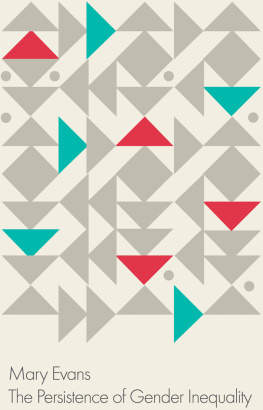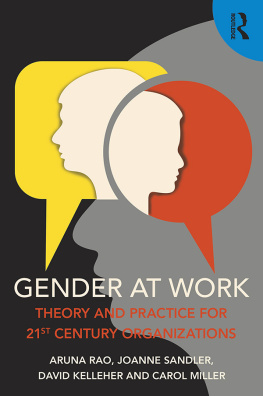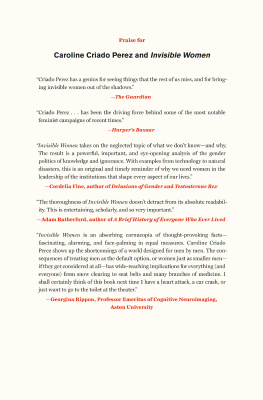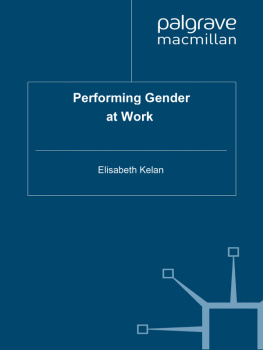Gill Whitty-Collins was born near Liverpool and after attending the local comprehensive high school went on to study at Cambridge University. After graduating, she joined Procter & Gamble, where she led global brands such as Pantene, Olay and Always, and swiftly moved up the ladder to Marketing Director, General Manager and finally Vice-President. Her story and vision will inspire you to join the force to make gender inequality history.
Why Men Win at Work
and how we can make inequality history
GILL WHITTY-COLLINS
First published 2020
eISBN: 978-1-910022-08-5
The authors right to be identified as author of this book under the Copyright, Designs and Patents Act 1988 has been asserted.
The paper used in this book is recyclable. It is made from
low chlorine pulps produced in a low energy, low emission manner from renewable forests.
Typeset in 10.5 point Sabon by Main Point Books, Edinburgh & Carrie Hutchison
Gill Whitty-Collins 2020
Contents
For my dad,
brother of three sisters,
father of three daughters
and the first femanist I knew.
Preface
I COULDNT HAVE written this book seven years ago. I wouldnt have even thought about writing it then. In fact, if someone had told me they were writing a book called Why Men Win at Work , I would have had no interest in it at all. If I had ever thought about it, I would have disagreed with the premise and maybe (probably) have got into an argument about it.
As the father of three girls, perhaps my poor dad had no choice but to believe in supporting girls and women because he was surrounded by us. To his huge credit, he embraced feminism and from as early as I can remember he never made us feel like we should do anything else but use our brains and work hard at school, get into a good university and get a good job that exercised our minds. Sadly, I did have girlfriends at school whose fathers didnt see girls the same way and parked all their paternal academic and career ambition with their sons. Not my dad though.
It also helped that I went to mixed schools where, thanks to a combination of hard work, sufficient intelligence and being famously well organised, I was usually top of the class or close to it. It really never occurred to me to question whether I was as good as or equal to a man. Nor did my time at the University of Cambridge give me any cause to ask gender inequality questions I was a pretty average student there overall but was privileged to come across some truly brilliant minds which came in both the male and female form. Then it was on to a career at a big international company, where for the first 18 years I would have told you that, while of course I was aware of gender diversity issues, I had personally never been on the wrong end of them. I had never felt in any way held back as a woman and, to be honest, I didnt understand why people made an issue of it. I am rather ashamed to admit that I used to be one of those women who was rather arrogant and dismissive of women who talked about gender inequality, and believed the issue was that they were perhaps not strong enough and should man up or should I say, woman up.
And then I saw it. And once I had seen it, I saw it every-where.
Not the old-school bum tap in the photocopy room kind. (Although I know this does still happen, along with its sinister digital age evolution of instant messenger stalking.) No, what I became aware of was the invisible kind. The unconscious kind of gender discrimination that is so embedded in our psyches that even good men with good intentions participate in and contribute to, men who would count themselves as unconditional believers in equality. The kind that is so unconscious and in-visible that even women themselves sometimes dont see it happening and, even worse, contribute to it themselves. The kind that ultimately defeated me, when so many other barriers along the way had not and has defeated, is defeating and will defeat many women in their careers if we continue to allow it to. The kind that is the real, underlying reason why women struggle to succeed and are so under-represented at the top levels in business and society.
And so now I have personally seen and understood it, I am livid, and I need to talk about it and do something about it. Why are men still winning at work? Why do we accept that we are living in a mans world where over 90% of all leadership positions in society and business are held by men and no progress is being made? We have seen that even a global pandemic couldnt shift us on gender equality when I began writing this book a year ago it was clear we were stuck and since then we have even gone into reverse, thanks to Covid-19. Women have taken on even more of the burden of housework and childcare to the detriment of their careers and face a Not now dear response to any attempt at equality or diversity discussions because this is not seen as a priority in a crisis. Yes, I am livid and I have decided to talk about it, even though I know how unwelcome and resisted this subject can be by both men and women. I am talking about it because if we dont keep raising the issue and fighting it, the unconscious system will keep on running in its unconscious way and we will still be here, in the same place, in 100 years. Brilliant women will still be under-leveraged and will not attain the positions in business and in society that should be theirs. We simply cannot let this happen.
A few points before we get stuck in.
While I spent 25 years of my career at Procter & Gamble, my fight is against gender inequality, not against them. I believe they are one of the better companies in their intentions and efforts to drive gender diversity. The gender inequality issues I talk about are ones that are seen and experienced in companies and organisations everywhere.
In order to talk about this issue, I am sometimes going to need to make generalisations about men vs women. I am very aware that we all sit on a spectrum of gendered behaviours, and on a spectrum of gender for that matter. There are men out there who will relate more to the female characteristics I discuss and women who will relate more to the male characteristics and people who will relate to other combinations of male and female characteristics. However, I need to make some generalisations about the way women are and the way men are, otherwise it isnt possible to talk about why women face inequality in business and society. And it is very important that we do talk about it.
I am also very aware that the gender diversity issue is only a subsection of the much broader equality and diversity issues that we face in our society. I will focus on gender inequality from the perspective of a cis white woman, because that is what I have experienced and understand, and will leave others who have the right knowledge and expertise to represent their experiences. I will say, however, that I believe that the interventions that will address the gender diversity issues I am raising will also go a long way to drive diversity and inclusion in general.
I must warn you that I am going to say some controversial things. I am going to say some things that you might not agree with or might not accept as real, or may believe are inflated versus reality. And you might get angry with what I will say. I know because this is what happens every time I discuss this subject, whether on a gender diversity panel or over a nice dinner and bottle of wine with friends. I have more to share than obvious points of view that everyone nods along with, otherwise I would not be wasting my time writing this book or asking you to waste your time reading it.

